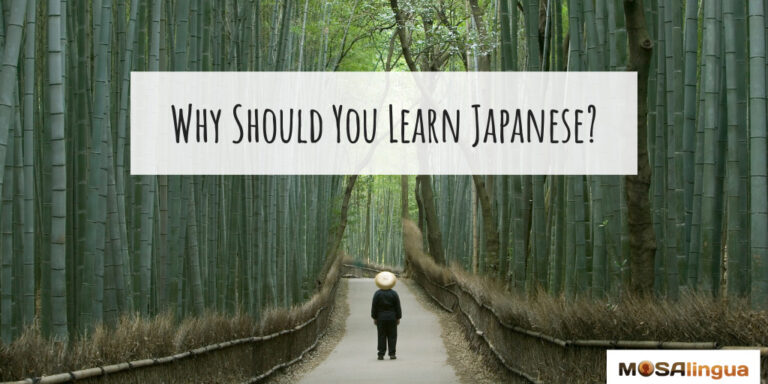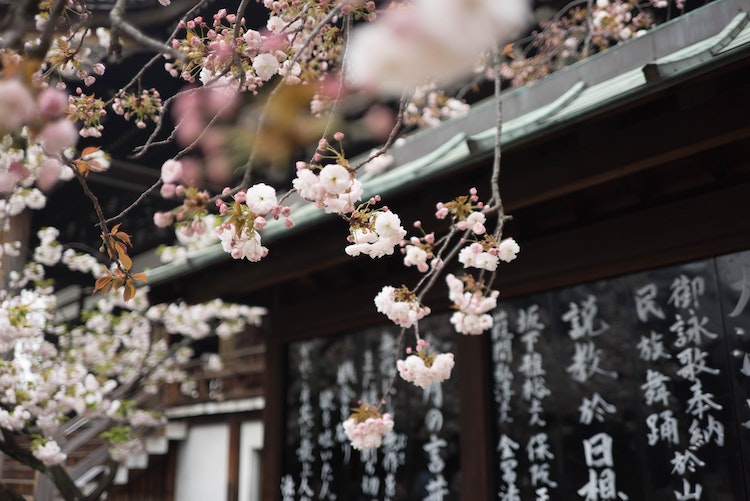Japan is a fascinating place in many regards. In fact, this country – both rich in traditions and at the forefront of modernity – seems infinite in its variety and individuality. In other words, Japan appeals to a wide range of interests. And what better way to start exploring and experiencing all that this amazing culture has to offer than by learning the language? If you’re asking yourself “Why learn Japanese?” I’ve put together a list of some of the great benefits of learning Japanese. I hope it will convince you!

Why Learn Japanese?
There are infinite reasons to learn Japanese. While I was a student at the Institut National des Langues et Civilisations Orientales in France, I learned that there were just as many reasons to learn Japanese as there were students (and there were 700 of us in the first year!).
Fashion, martial arts, cinema, anime, J-pop, cuisine, architecture, ceramics, Shintō, Buddhism, folklore, theatre, artisanal crafts, gardening, history, literature – the list goes on. Every person I met had a specific motivation for studying Japanese, some strong tie to the language, culture, or country itself.
In hindsight, it’s clear that the one thing we all had in common was our desire to learn the language in order to understand Japanese culture more intimately.
Explore culture through language
Learning Japanese doesn’t just mean acquiring a new skill. By learning this language, you’re opening the door to an incredibly rich culture that has something to offer for everyone. By mastering the language, you’ll be able to experience the subjects or activities that you enjoy on a whole new level.
I’ll give you an example of another way that learning Japanese might change the way you experience your surroundings. In my opinion, it’s worth much more than a list of explanations. Let’s look at the adjective samui, which translates to “cold” in English.
The sentence 今日は寒いです(kyō wa samui desu) means: It is cold today.
The adjective 寒い evokes a physical sensation and conveys the idea that the speaker feels the cold. On the other hand, the English sentence “It is cold” is a more objective observation. This difference between English and Japanese is just one illustration of how each culture thinks about and describes perceptions and feelings.
In the same way, the abundance of onomatopoeia (words that imitate sounds or emotions) in Japanese indicate how closely this language is linked with sensations. For example, when someone describes a pastry as fuwa fuwa, this sound evokes the idea of tender, spongy, or soft cake.
Start improving your Japanese today

Good news: we can help!
More good news: you can get started for free! With your free trial, you can test drive the most effective way to learn Japanese for the next 15 days!
Vocabulary flashcards, videos with subtitles, audiobooks, articles adapted to your level—with MosaLingua Premium (Web & Mobile), you’ll have access to all this and more. Get started right now. It’s free—and risk-free—to try!
Read or watch manga, anime, and films in Japanese
Do you love manga, anime, or Japanese cinema? What could be better than experiencing them authentically, without subtitles? Little details always get lost in translation, whether it’s the tone and mannerisms of a voice-over, or simply a cultural or linguistic concept that doesn’t translate, like humor (or perceptions, as I mentioned before). And so, being able to read or watch these works in Japanese ensures that you get the full experience, one that is closer to the experience intended by the creator.
What’s more, you’ll have access to lots more content that hasn’t ever been translated into English! Don’t worry too much about being able to read them – many texts are accompanied by furigana. (Furigana are hiragana that accompany kanji to provide their pronunciation.) So if you know your kana, you’ll be able to read them!
Visit Japan and make the most of your trip
Travel can be an excellent reason to learn a language. For the reasons I mentioned above, having even a rudimentary understanding of Japanese will help you navigate different situations, and gain a deeper understanding of Japanese culture.
And from a practical point of view, if you’re able to read hiragana and katakana, it will be much easier for you to get around cities, order in restaurants, ask for directions, etc. These days, there are a lot of signs in English to help encourage and facilitate tourism. But if you’re inclined to go off the beaten path at all, you’ll quickly find that it’s useful to know certain words and phrases, as well as how to decipher signs.
Many Japanese people speak limited English. So they are often very pleased, even honored, when foreigners make an effort to communicate in Japanese. Many friends have told me they were surprised at how warmly they were welcomed in Japan, even though they were only able to speak a little bit of Japanese.
This brings me to my next point: learning Japanese is a great way to make friends.
Make Japanese friends
As I said above, knowing how to speak Japanese is important for building relationships with Japanese people, for many reasons. For instance, many Japanese people don’t speak much English. I think part of this might be due to their tendency to be shy and introverted rather than any lack of exposure in school.
So learn Japanese if you want to have meaningful communication with native speakers. It will pay off. What better way to explore a language and culture than from the inside, from the perspective of a Japanese person? This is also a great way to make fast language progress, and to learn common popular phrases. Languages are living, evolving things that change over time – and today they’re changing faster than ever! Language instruction texts can sometimes be a little too fixed, and a little too formal. If you’re able to make acquaintances with native speakers, you’ll have easy access to the language as it’s actually spoken.
Study or work in Japan
Do you have an opportunity to study or work in Japan? Excellent! No matter which country you might relocate to, the most important piece of integration is often the language. You’ll need to have a base level in order to get by on a daily basis, have a social life, and navigate necessary administrative processes. This will make your transition much smoother!
Plus, Japanese isn’t as hard as you might think
Japanese has a reputation for being difficult to learn. Of course, the fact that it doesn’t share any roots with Indo-European languages does complicate the learning process. Frankly, it can seem downright unapproachable at first.
But let’s demystify that idea, because it won’t do anything but intimidate you.
On one hand – Japanese pronunciation poses no problem. Japanese has fewer phonemes than English, and there are no new sounds that you’ll need to learn.
As far as vocabulary is concerned, you’ll be surprised to see how much Japanese has borrowed from other languages – especially English. Gairaigo means “borrowed words.” These words of foreign origin (gai “foreign,” rai “to come,” go “language”) are re-transcribed in katakana.
Finally, the most difficult aspect of learning Japanese is its complex writing systems.
Japanese combines three different writing systems. For context, a reader needs to know about 1,945 kanji in order to read a newspaper. But don’t worry too much – it’s absolutely not necessary to know them all. Start with hiragana and katakana, both of which are important foundations, and will be very useful as you work on your pronunciation.
Kanji can come later, on your own time. There are several that you’ll absorb just by going through your daily life. And who knows – maybe you’ll find them interesting and seek out learning more!
Aspects of the Japanese Language That Might Make You Want to Learn It
Now that we’ve answered the question “Why learn Japanese?” learn about some of the things that set this language apart from others you may know. You could even look at them as a few more compelling reasons to learn it!
Its unique origins
Today, linguists consider Japanese to be an isolated language. This means that it doesn’t have a close relationship to any “parent” languages. It belongs to a category all its own – the Japonic language family.
It does share some qualities with Mongolian, Turkish, Korean, Malaysian, and some Polynesian languages. But for the most part, these similarities are limited to the language’s structure.
Interesting characteristics
Japanese is an agglutinative language. This means that morphemes (short units of language that carry specific meanings) make up words and ideas.
Let’s look at the example of the word 眠る (nemuru), which means “to sleep.” To say “I couldn’t fall asleep,” you’d say 眠れなかったです (nemurena katta desu).
nemur is the radical, to which we’ll add:
- re = suffix indicating potential
- na = suffix indicating negation
- katta = suffix indicating the past tense
- desu = suffix indicating the formal register
Also, Japanese is a language of particles. These short words don’t have a meaning on their own. However, you can couple them with other words to modify their tone or their meaning in different contexts.
Lots of Japanese speakers
About 125 million people of Japanese descent, and about 2.5 million others around the world, speak Japanese. It’s the third most used language on the Internet, with 88 million users online.
A unique writing system
Even though Japanese is classified in its own linguistic family, it has always borrowed lots of words from other languages. This started as early as the 7th century when the language adopted many words from Chinese.
The writing system that Japanese uses is also one of the most complex. It combines three very different alphabets: hiragana, katakana, and kanji.
But don’t worry too much – you don’t have to master all three of these when you first start learning Japanese. Hiragana and katakana are the most important, and you can learn kanji gradually.
Next Steps
If you found this article interesting, you might also enjoy:



![MosaLingua Learning Languages During Sleep Study [VIDEO]](https://www.mosalingua.com/en/files/2016/09/1-768x384-2-300x150.jpg)

Comments